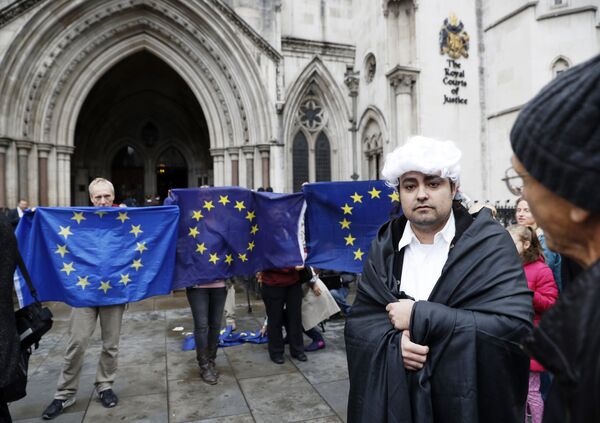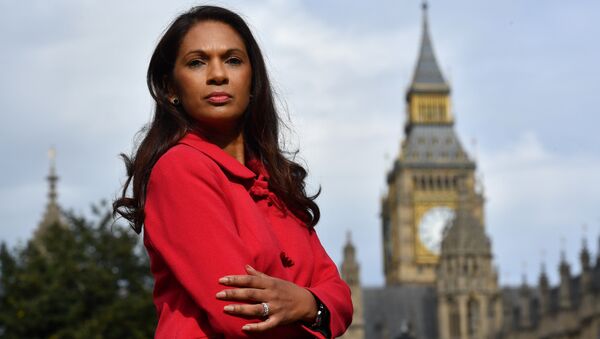On the morning of June 24, with the referendum's fairly conclusive 'leave' result confirmed and David Cameron's resignation submitted to the Queen, Gina Miller was engaged in a hectic succession of phone calls, on the hunt for a law firm that would help her ensure the Government would not trigger Article 50 of the Treaty on European Union, the European Union's withdrawal procedure, without an Act of Parliament being passed first.
UKSC confirms (by majority of 8:3) that an Act of Parliament is needed before Article 50 can be triggered 1/2 https://t.co/QUny4FUZIr
— UK Supreme Court (@UKSupremeCourt) January 24, 2017
Ultimately, Mishcon de Reya obliged, and quickly set to work forging a case. In the end, their argument was simple: Article 50 clearly states any Member State withdrawing from the Union must do so according to "its own constitutional requirements." The legal framework for the June 23 referendum did not place legal responsibility for actioning a 'Leave' vote in the hands of a Secretary of State, and parliament is sovereign according to the UK's (uncodified) constitution. Ergo, parliament is legally, and by convention, in charge of deciding whether or not to take action in response to the referendum result — and what form withdrawal should take.

Ms. Miller's pre-action letter was submitted to the High Court June 27. Contrary to media reports, she was no lone wolf — an accidental, unceremonious coalition of individuals and grassroots groups simultaneously sought the same ends.
"At that stage, the courts could've said there was no case to be heard. There was no guarantee it wouldn't be thrown out. However, sitting Judge Lord Leveson agreed there was a case. As a result, I was chosen as lead claimant," Ms. Miller told Sputnik.

Ms. Miller had no way of foreseeing how this simple organizational decision would come back to bite her.
"I was immediately branded a self-publicist by certain elements of the mainstream press. The idea I put myself up there is quite absurd. I believe the High Court chose me as lead claimant because we followed the right process — some of the other parties didn't submit a pre-action letter. Furthermore, I secured Lord Paddick as my lead counsel, and they wanted someone of his caliber to be the lead arguer — the lead claimant's counsel spends the majority of time in court. It was also just more efficient — there were a large number of parties with the same objective as me, and it simplified things to have one person named lead," she explained.
#GinaMiller is putting herself on the line to support Uk Rule of Law and democracy. We should all be supportive not spreading more hate!
— Dee Houlbrook (@dee_houlbrook) January 25, 2017
Nobody, not even the PM, is above the law. Thank you #GinaMiller for defending our sovereignty. Shame on the abusive scum who hate democracy
— (((Colin))) (@baroncols) January 24, 2017
Ms. Miller et al then had nine days in which to prepare their case in full. Little work was done in this regard prior to the High Court hearing, as the question of whether it would even accepted was very much up in the air until the moment of decision. Conversely, the government was given until September to prepare theirs.
"We were then contacted by the devolved powers and other interested parties in the case. We were very open and collegiate, sharing everything with everyone. It really became a team effort. When we saw the government's case in September, we were rather shocked," Ms. Miller says.
"We kept completely to the letter of the law in our case. Their case was very light on law, and very heavy on politics. We found that rather surprising — they had virtually nothing to say about any of the key legal pillars we addressed in our case. The result was the High Court judges ruled 3 — 0 in our favor. From a legal point of view, there were no grounds for appeal. We thought it would be a complete waste of time. My team was working pro bono; I was doing this in my spare time and funding my efforts myself. We only envisaged this reaching the High Court — we never thought it would reach the Supreme Court. If we'd lost, we wouldn't have appealed. We were pretty perturbed, because it meant we had to spend more time and money to prepare. It took things to a whole different level."
As for why Theresa May's government so determinedly pursued an appeal that was destined to fail, Ms. Miller can't be certain — but she's more than willing to speculate.
"My feeling is they were more than happy to hang me out to dry, while they went off and fashioned a 'Brexit' policy. They were in such shock when the leavers won, they had no plan for dealing with it. The appeal let them kick the can down the road, while I and the judges absorbed all the public and media venom. They were fighting a phony, theatrical war. The past six months have been a crash course in how politics really works."

What makes this onslaught all the more shocking is that while Ms. Miller was committed to Britain remaining in the EU, her support was not without caveats or criticism.
"I ended up falling out with the official remain campaigns, because I thought their messaging was far too binary. My message was 'remain, reform and review' — there are many areas in which the EU could be improved, and we should stay in because we could lead its reform. There are many member states that are concerned about the EU's finances, its push towards integration and its bureaucracy, among other things. We're not the only people in Europe concerned about these issues," she concluded.
Now the Supreme Court has ruled that parliament must vote on 'Brexit', the government has hastily moved to publish its draft Brexit Bill, which has had its first reading in parliament.
The Bill is expected to have its Second Reading Tuesday 31 January, before being considered in Committee Monday 6 and Tuesday 7 February, concluding in Committee on Wednesday, 8 February 2017 when the remaining stages are also due to take place.


